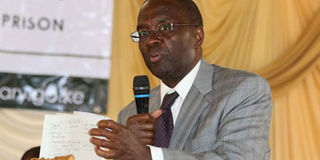Selection of next Chief Justice must be devoid of suspicion

This photo dated March 22, 2016 shows Chief Justice Willy Mutunga speaking at the Kamiti Maximum Security Prison in Kiambu. PHOTO | WILLIAM OERI | NATION MEDIA GROUP
What you need to know:
- Given our history in which the Executive has been a law unto itself, and the fact that elections for Parliament are largely a function of the “six-piece suit” and patronage, the Judiciary is one of the most important checks we have to ensure that our future does not mirror our past of dictatorship and misery.
- And every time we have had a Chief Justice willing to play ball with the Executive, the result has been increasing corruption, frustration and disenchantment. Though we have largely managed to survive before, the current trends of marginalisation suggest that a bad or weak choice for Chief Justice will accelerate our path to ruin and chaos.
There is general agreement, whatever our individual political views, that Kenya is a highly polarised, divided and suspicious country. And as elections approach, the tensions increase, and every decision is scrutinised in terms of what electoral objective it could serve. The trust, or social contract, that should exist between the governed and the decision makers was broken a long time ago, and the only way to engender trust, confidence and hope is if decision makers are transparent and explain their decisions.
This is the task before the Judicial Service Commission (JSC) today as it prepares to recruit our next Chief Justice, a decision making process that is fundamental to governance in Kenya. I hope the JSC understands the stakes in their decisions, for their processes, and choices, will be central in determining whether Kenyans treat the Supreme Court as a safety valve in the forthcoming elections, as we did in March 2013, or completely destroy the Supreme Court as a safety valve especially after their decision in April 2013 and subsequent political shenanigans around the retirement age of judges.
With interviews scheduled for August, the JSC should tell us why some people were excluded from the short-lists rather than leave it to speculation and rumours. Possible leakage to some news outlets does not cut it and contributes to the conspiracy theories that have already emerged.
Of course some qualifications are obvious, such as if a candidate is over the age of 70, for instance. But even then, it is incumbent for the JSC to officially inform us so we can begin restoring our confidence in the process. But if the reason for not making the shortlist is the unavailability of some documents such as clearances from Higher Education Loans Board, then we have a serious problem, suggesting that the exclusion of some candidates is more political and personal than it is about getting the right people for the right job.
How hard is it to ask aspirants to present all the relevant documents (which are not qualifications, incidentally) at the interviews? In fact, for most professional recruitments, these clearances, reference checks and vetting are required after interviews—not before—as the final stages in determining suitability.
The most important qualification for Chief Justice in a country like ours where Executive and legislative overreach is an everyday occurrence must be the ability and capacity to maintain and inspire judicial independence. This is not a manager’s job, as some less learned friends have asserted: Management and administration is the raison d'être of the Chief Registrar.
The Chief Justice needs to be someone who knows, respects and understands both the letter and spirit of the Constitution. Thus, for instance, we would be reasonable to doubt the suitability of a candidate who was quick to accept an illegal appointment that had to be overturned by the Courts. For those with longer memories, this is exactly what Judge Visram did when former President Mwai Kibaki purported to appoint him Chief Justice under the new Constitution, even when it was patently illegal.
More importantly, at times like these, Kenya needs someone as Chief Justice with the backbone—the kahunas, so to speak—to stare down our politicians whose instincts veer towards authoritarian rule, opaqueness and dictatorship. This is the hardest part of the job, but if done well permeates right through the Judiciary given cover and support to judges and magistrates to do their jobs independently. And in so doing, courts bend towards providing justice for the poor and marginalised, rather than serving the interests of the powerful.
Given our history in which the Executive has been a law unto itself, and the fact that elections for Parliament are largely a function of the “six-piece suit” and patronage, the Judiciary is one of the most important checks we have to ensure that our future does not mirror our past of dictatorship and misery. And every time we have had a Chief Justice willing to play ball with the Executive, the result has been increasing corruption, frustration and disenchantment. Though we have largely managed to survive before, the current trends of marginalisation suggest that a bad or weak choice for Chief Justice will accelerate our path to ruin and chaos.





